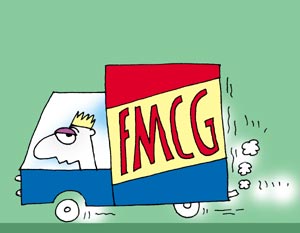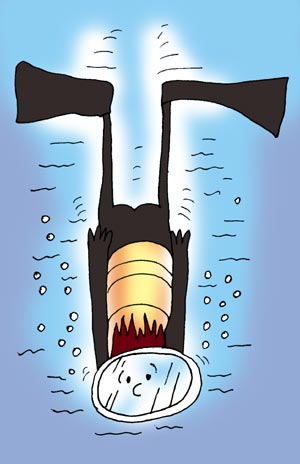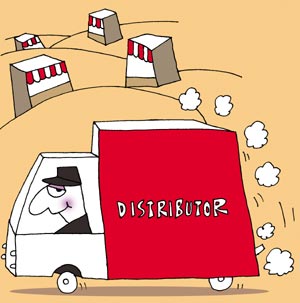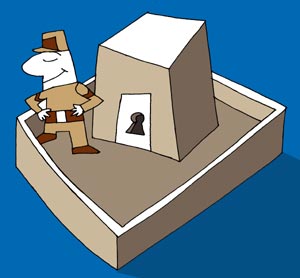
Writer, traveller, storyteller Ketan Joshi's book What They don't Teach You about Marketing is neither a textbook, nor management gyaan. Written storybook style it is the story of a young MBA, who joins an FMCG company as a management trainee.
Presented here is an excerpt from Chapter 1: Management trainee -- Joining the company.
'How did I get into this mess?' Mr. Ramesh Gopalkrishna, BE, MBA asked himself.
It was nearly noon, the temperature in the early forties, and he was standing in the middle of a dusty street with a heavy 'Salesman' bag cutting into his shoulders.
He had already been on the streets for three hours, and his shirt was soaked with sweat. But the beat was only half over, and he was nowhere near his daily sales target.
As he stood there, a truck zoomed past him, and he had to jump for his life.
Damn! He had stepped into a gooey mass of cow dung.
 This was not the life he had expected as an MBA, he thought, as he tried to scrape his shoe clean on a stone.
This was not the life he had expected as an MBA, he thought, as he tried to scrape his shoe clean on a stone.
Why was he in a dusty street in a one-horse town, sweating like a pig, and getting insulted by small time shopkeepers?
He sighed, wiped his streaming face with a soaked hanky and continued on his beat.
'Oh Lord, how did I get into this mess?'
Excerpted from What They don't Teach You about Marketing (Rs 195) by Ketan Joshi, with the permission of publishers Macmillan Publishers India Ltd. -- New Delhi.
Click here to buy What They don't Teach You about Marketing from rediff Books!

When Ramesh was completing his graduation in engineering, he glumly observed that the horror of education was not behind him after all, and he would have to slog all over again to enter an MBA school.
He slogged, cleared the entrance examinations to an MBA school, and observed with more horror that he would have to slog even more for two more years. And he did. 'But look on the bright side...' he said to himself, as he was working on an 'Operations Research' presentation in the early hours of a morning.
'At least I will not have to wear a dirty overall and move around in a smelly grease stained factory like my batch-mates who remained in engineering careers. I will be wearing a nice tie and sitting in perfect comfort in an air conditioned office once I become an MBA.'
Yeah, right.

Then finally came along the 'Placement week', when all the companies came to campus and selected students to join them. It was the raison d'etre for the two years of MBA. Mr. Ramesh Gopalkrishna, BE, MBA managed to get a coveted job in a leading FMCG organisation.
'Eff Em Jee See? What's that?'
'Oh come on dad! Not GC... CG. FMCG! Fast-moving consumer goods.'
'What do they do?'
'What do they do? They make fast moving consumer goods... soaps, toiletries, detergents, toothpaste... stuff like that.'
'Oh! Grocery walas. I paid for eighteen years of your education so that you can sell stuff to Grocery waalas! God almighty!'
'Its OK yaar.' His friend consoled him, as they were having tea at a dirty roadside stall. 'Just tell your father how much money you will be making. That will make him feel better.'
'Yeah, that's true. Some money at last. Soon I won't be forced to have cheap tea at roadside stalls.'

'Aaah!!'
Ramesh took a sip of his hot chai from the dirty roadside vendor and sighed with relief. Finally the day was over.
He had reported to work at the head office of the company, and had received an effusive welcome from the Human Resources department. The HR department organised a few days of induction training at the company training centre, where the management trainee batch of that year were introduced to the company and its various departments.
After the induction, it was time for their training stint in the Sales department. Ramesh had to start work as a frontline salesman in an upcountry area, which meant that he would be hitting the streets and selling directly to the shopkeepers in small towns and villages.
'At last, the day is over.' He thought as he went to a phone booth and called up the distributor to report the sales he had booked in the day.
'Yes, Ok, I will deliver it tomorrow. By the way saar, message for you from the boss. Please attend at the regional office tomorrow for Sales review.'
Oh no! A review again!
Sure enough, the review went well into the night, with all the sales people being roundly cursed by a succession of bosses. The abuse started with poor sales performance, and then continued to poor reporting, late expense reports, poor appearance, poor merchandising and everything under the sun. They ended up sitting in the office till the crack of dawn filling up all kinds of forms and reports, and the last thing they heard as they filed out was their supervisor bellowing at them 'And I want you to be in the market at 9 'o clock sharp, you understand?'
How did I get into this mess?

The problem with this 'throw in the deep end and see them sink or swim' system of management training was that while it gave the trainees a bottom view of the system, it did not give them the big picture. Ramesh just saw the targets for the month, and the agitated face of his manager if the targets were not met. The pressure and surroundings got to some of the other trainees.
One trainee couldn't take it after a couple of weeks and he quit. Not only did he quit the company, but he quit the Sales and Marketing line altogether and went to do his CA.
Ramesh may have had cracked as well, if he had not met his senior from college one day, and sat down for a cup of coffee with him.
The senior heard out his woes sympathetically and after Ramesh was through, patted his back reassuringly.
'Dude, you are taking too much tension. Relax. What you need to concentrate on now is not sales or meeting targets. You are a Management Trainee. Your job is to learn how the system works, that's all. If you get hassled when your supervisor picks on you, just remember that you are going to be confirmed at a level superior to him, and tell him to back off. He will, don't worry.'
The senior stopped for a moment to take a bite at his wada-pav and continued 'But that is not to say that you should throw your weight around. Just keep perspective, observe and analyse.'

For instance, just think about the sales system. What is the sales system? It's just a distribution system.
What does your employer want to do? He wants to make something, and sell it to people who want such things -- for more money than he spent to make it -- so that he can make money.
But to make serious money, he needs to sell his product to millions of consumers, right? But he can't reach so many people directly. So he hires people to sell his product for him, and pays them a salary. This is called the Sales force.
But even all these employees can't reach too many people directly. So the Sales force sells the product to shopkeepers, who will then sell it to many more consumers.
But there are too many shopkeepers. We sell to more than thirty lakh shopkeepers all over the country. We can't afford to hire so many people to sell things directly to thirty lakh shopkeepers. The cost of people, the credit policies, the delivery costs... it will become unmanageable.
So we decide to sell our stock in bulk to some businessmen, who will then go around selling it to shopkeepers. These businessmen are called distributors. They buy from us in bulk, and sell, not to individual consumers, but to shopkeepers, who then sell it to consumers.
But you know we have factories only at two places, while we sell our products all over the country. We can't afford to send trucks to every distributor directly from our factory.

That's why we work with another kind of businessman. These people buy or rent huge warehouses, and we send stocks from our factory to these warehouses. The businessman agrees to do all the local work to get our stock, store it and send to local distributors as and when they ask for it. These guys don't buy our stocks; they are just our agents. We call them clearing and forwarding agents, or CFAs.
And that's all -- factory makes products, sends in bulk to CFA who holds it for us. The local sales representatives sell stocks to distributors, and the CFA sends it to them. The Distributor pays us money, and the stock becomes his. He then sells either to smaller distributors, wholesalers or shopkeepers. Shopkeepers sell it to consumers. All the people involved in this chain get a commission.'
The senior took another bite at his snack.
'That's it. Your job as a Sales Manager is two fold -- sales and money collection.
Sales: you have to ensure that shopkeepers buy ample amount of stocks, and distributors have adequate stocks to sell to these shop keepers. Of course, as a Sales Manager, you have accurately forecast your future sales, as you will have to ask the factory to produce and send that much product to the CFAs, so that you will have stocks to sell to the Distributors.

Money collection: you have to ensure that these distributors pay in time. The sales department is the only department that brings in the money, you know.
'And after all, money is the reason why this whole gigantic company is operating.'
Ramesh listened intently to all of this. 'Are you saying that it's that simple?'
'Well, obviously as you get into actually doing it, you will find that there are a lot of fine details and complexities, but yes -- conceptually it's that simple. Now that you have grasped the main idea, you will find life easier to bear.
For instance, you will appreciate the importance of 'reports' much better, and treat them with respect and understanding.
Sales forecasts: Every month, salespeople are required to submit sales forecasts for the next three months; and most salespeople hate doing this. In such a competitive and dynamic scenario how can I say how I will be able to sell three months later? That too size wise! Each product is available in at least three sizes, some in five or six sizes. And there are about twenty brands. So I have to give a forecast for more than sixty specific products -- for three months -- that is one hundred and eighty specific numbers, which I will be held responsible for achieving in the future. How is it possible?
But you have to understand that the factory produces each size separately, and it needs to order raw material, packaging material and make production plans. The Dispatch department needs time to deliver it to the depots. More time is needed for the stock to reach the distributors and then to reach the shopkeepers. The Finance department needs to allocate funds to pay all the suppliers, and needs to know how much money will be coming in the next few months.
All this is possible only with an accurate forecast, and an accurate national forecast is nothing but the summing up of accurate forecasts from individual sales people.
Or take another report that irritates sales people. Coverage report. In other words, how many shops are you selling to? Sales people find it very difficult to give accurate numbers and get irritated when they are questioned on this.
But ultimately, consumers buy items from shops, and more consumers will buy if it is available in more shops. Sales growth will come only from two things -- same amount of consumers buying more, or more consumers buying our product. And it is unlikely that consumers will buy more than their normal amount of soap or toothpaste. So it is very important that we keep a continuous eye on the number of shops we are present in, and try to add to that number every month.
'Ensure that you are keeping an eye on the big picture and you will enjoy your sales stint and find it very useful.'